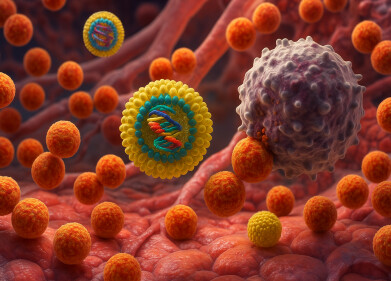News
Early Lung Cancer Detection with Molecular Profiling
Feb 21 2019
Researchers at UCL, have for the first time, discovered the differences between precancerous lesions in the airway that are potentially invasive and those that will either disappear or remain as harmless. “Our study* helps to understand the earliest stages of lung cancer development by figuring out what’s going on inside these cells even before they become cancerous,” said lead author, Professor Sam Janes (UCL Division of Medicine and University College London Hospitals, UCLH). “Using this information we may be able to develop screening tests and new treatments that could stop cancer in its tracks.”
The researchers conducted tests including gene expression profiling, methylation profiling and whole-genome DNA sequencing on 129 preinvasive biopsy samples from 85 patients seen at UCLH. On average, the patients were followed up for over five years post-biopsy, to see which patients developed lung squamous cell carcinoma, one of the two most common subtypes of lung cancer.
The research team identified differences in genomic features such as mutations, gene expression and chromosomal instability, finding enough differences that they could predict with near-perfect accuracy which lesions would develop into cancer by checking the lesion’s molecular profile.
The researchers suggested that such predictability could help clinicians decide whether or not to offer a patient surgery at a much earlier stage of the disease than is currently possible, while saving others with benign lesions from unnecessary surgeries.
While precancerous lesions are normally detected by bronchoscopy the researchers also said their findings could help to develop a simpler blood test to pick up the same molecular signals that are linked to early cancer development.
“If we can use this new understanding of cancer development to create new diagnostic tests, it may one day be invaluable in picking up cancer early, enabling people to access treatment much earlier in the disease process,” said co-first author Dr Adam Pennycuick (UCL Division of Medicine).
The study could also help lead to new treatments. Some of the genes that are expressed differently in lesions that will become cancerous, have previously been identified as potential drivers of lung cancer.
“We are now continuing our research to further understand how these genes are driving cancer progression, and to see which ones could be targeted by new drug treatments,” said co-first author Dr Vitor Teixeira (UCL Division of Medicine).
The study involved researchers at UCL Division of Medicine, UCL Cancer Insititute, UCLH, Wellcome Sanger Institute, Boston University, The Francis Crick Institute, Cancer Research UK Cambridge Institute and University of St Andrews, and was supported by Wellcome, Rosetrees Trust, Roy Castle Lung Cancer Foundation, Welton Trust, Garfield Weston Trust, Stoneygate Trust, UCLH Charitable Foundation, Cancer Research UK, Stand Up to Cancer, and the University College London Hospitals National Institute for Health Research Biomedical Research Centre.
*Published in Nature Medicine
Digital Edition
Lab Asia Dec 2025
December 2025
Chromatography Articles- Cutting-edge sample preparation tools help laboratories to stay ahead of the curveMass Spectrometry & Spectroscopy Articles- Unlocking the complexity of metabolomics: Pushi...
View all digital editions
Events
Jan 21 2026 Tokyo, Japan
Jan 28 2026 Tokyo, Japan
Jan 29 2026 New Delhi, India
Feb 07 2026 Boston, MA, USA
Asia Pharma Expo/Asia Lab Expo
Feb 12 2026 Dhaka, Bangladesh



















